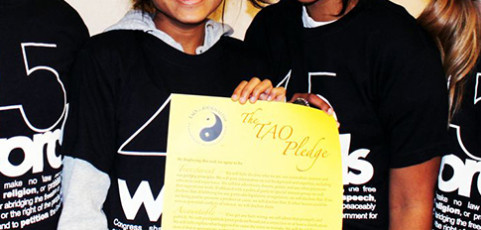“Student media are designated public forums, and free from censorship and advance approval of content. Because content and funding are unrelated, and because the role of adviser does not include advance review of content, student media are free to develop editorial policies and news coverage with the understanding that students and student organizations speak only for themselves. Administrators, faculty, staff or other agents shall not consider the student media’s content when making decisions regarding the media’s funding or faculty adviser.”
— Society of Professional Journalists’ Campus Media Statement
Laws indicate what journalists must do while ethics indicate what they should do.
Rooted in ethics, responsible and free journalism adheres to applicable laws and operates using professional standards to enhance student media’s reach and impact.
Journalism, truly the cornerstone of democracy, starts at the scholastic media level, where students learn the legal and ethical implications of free media that make the United States unique among nations.
According to the National Scholastic Press Association Model Code of Ethics, developing a sense of ethics is “essential for student journalists, who learn to distinguish right from wrong and good from bad in their work.”
A working knowledge of ethics can be helpful in reporting sensitive or controversial issues. A staff working its way through a list of questions to make ethical decisions solves problems before they occur. In the process, students generate valuable comments, discussions and considerations.
Journalism ethics are important as students learn to:
• Develop ethical fitness;
• Verify information and sources;
• Seek truth;
• Value free expression;
• Think critically while making decisions.
In “Red Light, Green Light: A Plea for Balance in Ethics,” Roy Peter Clark of The Poynter Institute, a media training center, speaks in favor of green-light ethics compared with the typical red-light ethics. Red-light ethics typically focus on reportorial misbehavior, emphasize restraint and caution, and suggest what reporters “ought not” do.
Green-light ethics, Clark says, emphasize duty and the process of publishing information, rather than excluding it.
Green light means report — dig into issues that need digging into, reporting them in a way that brings light but does so by demanding verification, accuracy, thoroughness and transparency. It also means learning to face problems and issues.
Rushworth Kidder, founder of the Institute of Global Ethics, stresses students’ need to think for themselves. In How Good People Make Tough Choices: Resolving the Dilemmas of Ethical Living, Kidder speaks of ethics as a practice of learning to make “right versus right” choices. Right-versus-wrong choices, he says, are matters of law.
“Right versus right, then,” he says, “is at the heart of our toughest choices. Does that mean there are no right versus wrong choices? Is ‘wrong’ only someone else’s definition of what I think is right?”
No, he says, right-versus-wrong choices differ from right-versus-right ones. Right-versus-right teaches depth in shaping values.
Learning to explore and solve these dilemmas, Kidder says, involves the really tough choices. Crucial learning then occurs.
This is the greatest impact of scholastic journalism, not only in information gathering, reporting and presentation, but also in achieving life-long learning.
Kidder, speaking about ethics in the 21st century, says, “Core values are like moral reagents: They sometimes clash together with plenty of energy and fervor. There are no conflicts as challenging, long-lasting or intractable as those that grow out of moral issues. Yet there are no more important issues to resolve than those on the ethical landscape.”
Journalism’s core values speak to the need to understand legal and ethical issues – and the need to handle them with courage, idealism and skepticism.
See also:
First Amendment and student media
Journalism ethics at center stage
School boards and student media
The value of using social media in journalism
Internet access and safety
Yearbook ethical guidelines for student media
Online ethical guidelines for student media
Visual ethical guidelines for student media
Definitions of prior review, restraint and forums
Which type of forum best serves your students and community
Importance of open forum status
JEA Adviser Code of Ethics
Internet freedom of expression
Why avoiding prior review is educationally sound
First Amendment Press Freedom questions
Resources
• How Good People Make Tough Choices, Resolving the Dilemmas of Ethical Living, Rushworth Kidder, 1995, Harper.
Online resources
• Administrators should support scholastic journalism
http://www.jeasprc.org/wp-content/uploads/2011/02/Foundationadminadvice.pdf
• Advice for administrators: Student media can equal solid learning
http://jeasprc.org/tag/advisers/
• A free and responsible student press
http://www.jeasprc.org/wp-content/uploads/2011/02/sprcfoundation2.pdf
• Association of Schools of Journalism and Mass Communication’s statement on the value of scholastic media
http://www.asjmc.org/resources/scholastic/scholastic_media.php
• Choosing your forum status is like choosing the best medicine
http://jeasprc.org/choosing-forum-status-like-choosing-best-medicine/
• Common Core has room for law and ethics
http://jeasprc.org/yes-common-core-has-room-for-law-ethics/
• Cover ethics first
http://www.walsworthyearbooks.com/idea-file/6790/rights-in-balance-cover-ethics-first/
• Decision making and content control rests with students, rooted in professional standards
http://jeasprc.org/tag/decision-making/
• Ethics in the eye of the storm
http://jeasprc.org/ethics-in-the-eye-of-the-storm-keep-your-live-coverage-error-free/
• Hypotheticals on journalism ethics
http://jea.org/blog/2012/09/04/hypotheticals-on-journalism-ethics/
• Institute for Global Ethics
http://www.globalethics.org
• Journalism Education Association Adviser Code of Ethics
http://www.jeasprc.org/wp-content/uploads/2012/03/JEAadvisercodeof-ethics-2012.pdf
• JEA ethical guidelines for student media
http://www.jeasprc.org/wp-content/uploads/2011/11/OnlineEthics-GuidelinesforStudentMedia.pdf
• JEA position statements
http://jea.org/home/about-jea/statements/
• Journalism meets the needs of the 21st century
http://www.jeasprc.org/wp-content/uploads/2011/02/sprc-foundation1.pdf
• Journalistic responsibility
http://www.ojr.org/ojr/people/phazra57/200902/1648/
• Legal and ethical foundations for tomorrow’s citizens
http://jeasprc.org/sjw11-and-beyond-legal-and-ethical-foundations-for-tomorrows-citizens/
• NSPA Student Code of Ethics
http://studentpress.org/nspa/pdf/wheel_modelcodeofethics.pdf
• The New York Times ethical handbook
http://www.nytco.com/pdf/NYT_Ethical_Journalism_0904.pdf
• Red light, green light: a plea for balance in media ethics
http://www.poynter.org/uncategorized/58912/red-light-green-light-a-plea-for-balance-in-media-ethics/
• Setting the foundation for journalism education
http://www.jeasprc.org/wp-content/uploads/2011/02/sprc-foundstnds8.pdf
• Student press rights and ethics links
http://www.hsj.org/Journalism_101/index.cfm?requestAction=goMenuContent&menu_id=7&menu_page_item_id=38&CmsPagesID=221
• Social Media Toolbox available to help those considering, and using, social media in journalism
http://jeasprc.org/social-media-toolbox-available-to-help-those-considering-and-using-social-media-in-journalism/
• Social Media Toolbox
http://hendricksproject.wordpress.com
• Teaching journalism ethics
http://teachingjournalismethics.wordpress.com
• The Elements of Journalism
http://www.journalism.org/node/71 orhttp://www.journalism.org/resources/principles
• Visual reporting ethical guidelines
http://jeasprc.org/visual-ethics-guidelines-join-online-and-yearbook-information/
• Yearbook ethics guidelines
http://jeasprc.org/yearbook-ethics-guidelines/




